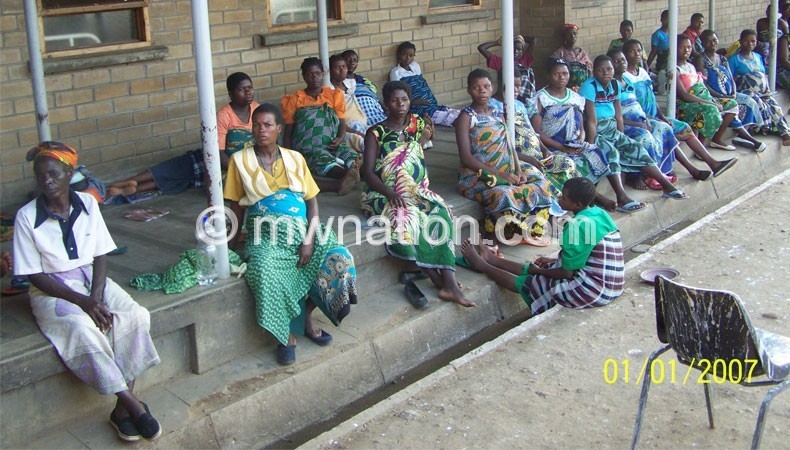Is Presidential Initiative on Safe Motherhood bearing fruit?
Linyangwa Health Centre, which is in traditional authority (T/A) Lukwa in Kasungu is an epitome of the glaring inefficiencies and inequalities that exist in the health sector, particularly in the campaign to promote safe motherhood in the country.
It is a contradiction or reversal to the commitment elected political leaders such as the Presidents have been making in as far as the promotion of safe motherhood is concerned.
Bua Health Centre in T/A Njombwa, also in Kasungu, is another facility that mocks and questions the activities of the Presidential Initiative on Maternal, Child Health and Safe Motherhood (PIMCHSM).
Both facilities are operating without ideal and recommended sanitation and hygiene facilities thereby putting lives of expectant women, guardians and their expected children at risk.
Bernadetta Kanzuli, a 32-year old mother from group village head (GVH) Chitseko in T/A Njombwa, could not hide her distress and despair recently.
Kanzuli, taking advantage of the public rally National Initiative for Civic Education (Nice) Trust organised to raise awareness on the need to integrate issues of sanitation and hygiene in safe motherhood initiatives, questioned government’s sincerity in its commitment to promote safe motherhood.
She said: “Nice is doing a commendable job by sensitising us to the need to integrate.”
Apparently, Nice is implementing water, sanitation and hygiene (Wash) in maternal and neonatal health (Deliver Life) Project with financial support from the Water Aid in selected health centres of Kasungu.
But Kanzuli wondered whether government was indeed serious about translating its promises on safe motherhood into reality.
She emphasised that the dwindling levels of sanitation and hygiene in waiting homes and/or labour wards are some of the deterrents to the promotion of safe motherhood.
“Is government really serious about the safe motherhood initiative? Bua Health Centre is stinking and it is doing nothing about it. This makes life horrible for expectant women and their guardians. Where are our leaders?” she asked.
Kanzuli wondered how government aims to tackle maternal and neonatal deaths and morbidity when it is failing to provide structures to motivate expectant women to deliver at the health facilities.
“How does government or that Presidential Initiative on Safe Motherhood back its call for women to deliver at the health facility? Does government want us to die of waterborne diseases contracted right in the corridors of the health centre?” she asked.
Councillor for the area (Nziza Ward) in Kasungu South East Constituency, Anne Mtenje, further aggravated Kanzuli’s distress when she declared that government is at the moment not providing any resources for the construction of sanitation and hygiene facilities.
Mtenje told participants that her plea for government support and its development partners has also not yielded the much-desired result.
“Government—through the District Council—says it does not have resources for the implementation of sanitation and hygiene projects at the moment. I have been pestering the council secretariat, but nothing tangible is coming forth,” she emptied her chest.
Mtenje feared expectant women could be risking their lives by seeking and accessing services at a facility that does not meet the most basic standards of sanitation and hygiene.
Thus, she made an impassioned appeal to government and other players in the health sector to help address sanitation and hygiene problems at Bua Maternity Clinic.
“If they think we are joking, I wish to plead with government officials and its development partners to come and appreciate for themselves how bad the situation is at Bua Health Centre,” said the councillor.
Buwa senior health surveillance assistance (SHSA) Collings Chinyanga revealed that he usually uses personal finances to meet the costs of other basic sanitation and hygiene items.
Chinyanga cited the tablets of soap women use to wash their hands after the toilet as one of the items he buys using personal cash.
“I do this not because I have more than enough, but to save women from contracting sanitation and hygiene-related infections,” he explained.
T/A Njombwa said there is need for the strengthening of local policies and standards, ensuring sufficient financing and trained staff to manage Wash in healthcare facilities, using risk-based approaches to prioritise and maintain improvements, and harmonise and expand monitoring.
Kasungu District Health Office (DHO) safe motherhood coordinator, Phebby Lodzeni, acknowledged that implications for health are severe where facilities are operating without necessary sanitation and hygiene facilities.
Nice district civic education officer for Kasungu, Gerald Chirwa, said realising improvements in Wash in healthcare facilities requires commitment from partners in both the health and environment sectors at every level-local and district.
PIMCHSM national coordinator Chimwemwe Chipungu acknowledged recently that although government had made strides in preventing deaths of mothers and children in the country, there is still a lot to be done to successfully win the battle.
Chipungu said government is struggling to provide adequate human and material resources in public health facilities; hence, he agreed with Chirwa that there is need for collective efforts to address the problems.





